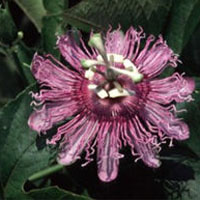Penn Herb Wellness Guide
Passion FlowerFind Products
 © Steven Foster
© Steven FosterParts Used & Where Grown
Passion flower is a climbing vine renowned for its beautiful white flowers with purple, blue, or pink calyx crown blooms. The plant is native to North, Central, and South America. While primarily tropical, some of its 400 species can grow in colder climates. The mystery of such a beautiful blossom emerging from an unassuming bud has been compared to the Passion of Christ. This inspired the plant’s name, which dates back to the 17th century. The leaves, stems, and flowers are used for medicinal purposes.
- Reliable and relatively consistent scientific data showing a substantial health benefit.
- Contradictory, insufficient, or preliminary studies suggesting a health benefit or minimal health benefit.
- For an herb, supported by traditional use but minimal or no scientific evidence. For a supplement,little scientific support.
Our proprietary “Star-Rating” system was developed to help you easily understand the amount of scientific support behind each supplement in relation to a specific health condition. While there is no way to predict whether a vitamin, mineral, or herb will successfully treat or prevent associated health conditions, our unique ratings tell you how well these supplements are understood by the medical community, and whether studies have found them to be effective for other people.
For over a decade, our team has combed through thousands of research articles published in reputable journals. To help you make educated decisions, and to better understand controversial or confusing supplements, our medical experts have digested the science into these three easy-to-follow ratings. We hope this provides you with a helpful resource to make informed decisions towards your health and well-being.
This supplement has been used in connection with the following health conditions:
| Used for | Amount | Why |
|---|---|---|
Anxiety (Valerian) | 100 to 200 mg valerian and 45 to 90 mg passion flower three times a day | A combination of passion flower and valerian has been shown to reduce symptoms in people suffering from anxiety. |
Insomnia | Refer to label instructions | Passion flower is commonly recommended by doctors as a mild sedative for those suffering from insomnia or nervous exhaustion. |
Pain | Refer to label instructions | Passion flower has been historically used to relieve pain. |
Traditional Use (May Not Be Supported by Scientific Studies)
The historical use of passion flower is not dissimilar to its current use as a mild sedative. Medicinal use of the herb did not begin until the late 19th century in the United States. Passion flower was used to treat nervous restlessness and gastrointestinal spasms. In short, the effects of passion flower were believed to be primarily on the nervous system, particularly for anxiety due to mental worry and overwork.1
The effectiveness of passion flower as a treatment for anxiety has been confirmed in a double-blind study. In that study, 45 drops per day of an extract of passion flower taken for four weeks was as effective as 30 mg per day of oxazepam (Serax), a medication used for anxiety.2
Copyright 2025 TraceGains, Inc. All rights reserved.
Learn more about TraceGains, the company.
The information presented by TraceGains is for informational purposes only. It is based on scientific studies (human, animal, or in vitro), clinical experience, or traditional usage as cited in each article. The results reported may not necessarily occur in all individuals. Self-treatment is not recommended for life-threatening conditions that require medical treatment under a doctor's care. For many of the conditions discussed, treatment with prescription or over the counter medication is also available. Consult your doctor, practitioner, and/or pharmacist for any health problem and before using any supplements or before making any changes in prescribed medications. Information expires December 2025.


